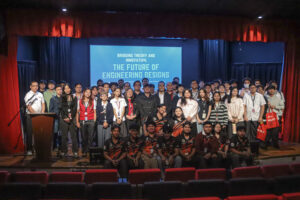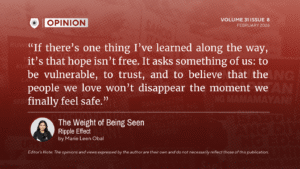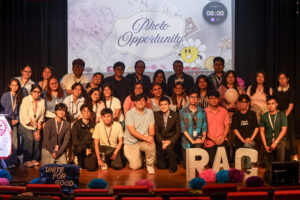By Louise Margareth T. Mansing | April 6, 2024
In Defense of Being OA
“ANG OA NG MGA BATA NGAYON,”
a common observation that many adults point out on various social media platforms such as Facebook and Twitter. Rants about Generation Z being too sensitive or being “woke” when it comes to different issues is a topic of many hot debates online. A lot of these accusations are often counter-attacked by those accused, claiming that sensitivity to social issues should not be seen as a negative thing. Within the arguments that are continuously gaining heat, it is worth asking whether or not being OA is bad or not.
The acronym OA means “over acting” which pertains to the quality of being dramatic in situations that don’t merit it. Today, it is often used as humorous slang or to describe anyone who shows great awareness of an issue by those who perceive the issue with little concern. Older netizens talk about how “small” things often trigger the youth into going into “defensive” online tirades, championing those who are targets of insensitive “jokes'' that are taken seriously. Social media plays a role in promulgating a culture of freedom of speech which includes discourse about how far jokes can and should go. It is, however, important to note that the older generation grew up in a culture where jokes were not called out as insensitive, rather humor is simply that, humor. An example is the use of the word gay or bakla to refer to someone who displays characteristics that are socially viewed as feminine. However, when it comes to younger netizens, the use of the term is discouraged due to the growing movement of LGBTQ+ awareness. This issue alone prompts debate about Gen Z being too soft or OA.
Labels like “Ang OA mo naman!” may feel insulting to some, however, instead of dismissing this trait as negative, it might carry more value when seen in a different light. It’s important to acknowledge that Generation Z grew up in a time where sensitive social issues have long been exposed and openly debated. They are constantly exposed to different news about these injustices through the use of social media, television, and other forms of media. Online activism is very apparent and since news channels regularly broadcast these types of content, this can lead to greater understanding which eventually results in increased empathy and sensitivity to these issues. Younger individuals also have a desire for respect when it comes to individual characteristics, and they would want to see this respect flourish despite claims of being excessively sensitive or prematurely woke.
Perhaps being called OA has its merits. Being OA might just be what society needs for us to have social progress. Instead of viewing it negatively, it can raise the possibilities for inclusivity. Generation Z’s tendency to be OA shows a willingness to speak up against injustices and a penchant for change.
Volume 29 | Issue 3




